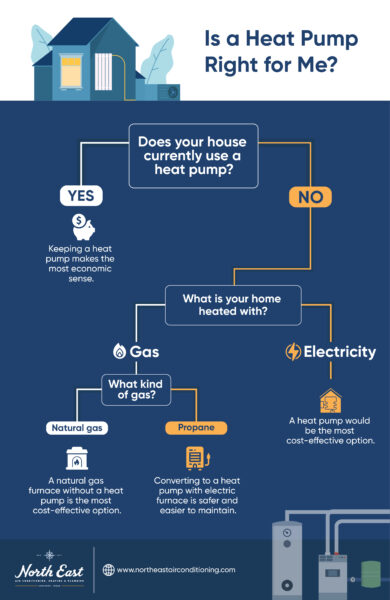Due to their rise in popularity, our clients at North East Air Conditioning, Heating and Plumbing sometimes ask us whether a heat pump is right for them. Before deciding if this type of appliance is the best fit for your home, you must first understand how a heat pump works and in what scenarios installing a heat pump would be recommended.
What is a heat pump?
The simplest way to understand heat pumps is by comparing them to standard AC systems. Both use compressed refrigerant to absorb and remove heat from the air, and both move the heat from one place to another. Standard systems are employed in the summer, moving heat from inside the home to the outside. Heat pumps do this, too, because they use the same technology to cool your home as standard air conditioners. They also can, in cooler months, extract heat from the air outside and move it inside the home. In other words, heat pumps can not only cool in the summer, they also can heat a home in the winter. Simply put, heat pumps do the job of both an air conditioner and a furnace in the right conditions.
Here’s the catch. While heat pumps do provide a heating function, they can only do so efficiently in temperatures above 50 degrees Fahrenheit. That’s why you’ll always see heat pumps installed with an electric furnace to serve as an auxiliary heat source. Why electric? Heat pumps are paired with an electric heat source because if gas were available then heat pumps would not be the recommended system in the first place.
Does a heat pump make sense for me?
Where gas is not available, heat pumps have an edge over standard AC systems since, when temperatures are cold (but not below freezing) heat pumps, along with their electric furnace, are a more cost-effective option than running an electric furnace alone. When freezing temperatures do arrive, your heat pump’s furnace will do the same job as the electric furnace paired with a standard AC. Sure, heat pumps are a little more expensive to install and repair than standard AC, but in the long term they’ll save you money through their efficiency.
If your house uses natural gas, then a gas furnace is your most cost-effective source of heat. For any given amount of heat required, the electricity required by a heat pump’s furnace would be more expensive than running a natural gas furnace. That rules out a heat pump because with efficient gas heat you wouldn’t utilize the heating function of a heat pump at all, in which case you would opt for the less expensive standard AC system.
If you have an old heat pump that needs to be replaced, we will generally recommend replacing it with another heat pump because this is the only option that makes economic sense for your home.
If your home is heated with propane, we will likely recommend converting your propane system to a heat pump with an electric furnace. Propane is highly corrosive and, over time, propane systems are prone to leaks, a concern for homeowners. A heat pump with an electric furnace is safer and easier to maintain.
Take a look at the decision tree below to determine whether a heat pump is right for you.
Conclusion
Now that we identified what makes a heat pump unique and addressed when we would recommend a heat pump, based on cost efficiency and the available heat source, you as a San Antonio homeowner can feel more confident making a decision when presented with this option. At North East Air Conditioning, Heating and Plumbing, we’re happy to help you decide which type of heating system is right for your home. Call today to set up an initial consultation.
Header Photo by Chandra Maharzan on Unsplash



